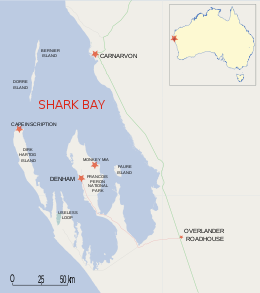Bernier Island
 | |
| Geography | |
|---|---|
| Location | Shark Bay |
| Administration | |
Australia | |
| State | Western Australia |
| Region | Gascoyne |
Bernier Island is one of three islands that comprise the Bernier and Dorre Island Nature Reserve in the Shark Bay World Heritage area in Western Australia.[1]
The island and the neighbouring Dorre Island were locations for a lock hospital in the early 1900s.[2][3]
Geography[edit]
It is located at the north-western corner of the World Heritage area, almost due west of Carnarvon, Western Australia. The 2.6 hectares (6 acres) Koks Island is offshore from the lighthouse at its northern end. It is separated from Dorre Island to its south by a 500 metres (1,640 ft) gap with a depth of 4 m (13 ft).
Fauna[edit]
The island is home to one of the few remaining colonies of the Banded Hare-wallaby (Lagostrophus fasciatus)[4] and the endangered species of mouse Pseudomys fieldi, known as djoongari or the Shark Bay mouse, of which there is an estimated 5,000 to 9,000 individuals.[5]
Use as a lock hospital (1908-1919)[edit]
In 1908 the Western Australian government created lock hospitals on Bernier and Dorre Islands, in order to forcibly incarcerate Aboriginal people suspected of having venereal disease.[6] Aboriginal men were mostly detained on Bernier; Aboriginal women and children, mostly on Dorre.
The facilities at the lock hospitals were inadequate, inmates had no contact with their families back home, and underwent experimental medical treatments.[7] It is conservatively estimated that 200 people died on the two islands, with their remains left in unmarked areas.[8] During the 2019 centenary commemoration, Regional Development Minister Alannah MacTiernan described the Bernier and Dorre lock hospital era as "a really horrific piece of Western Australian history".[7]
Memorial[edit]
In April 2019 the Lock Hospital Tragedy Memorial "Don't look at the Islands", was installed on the mainland at Carnarvon, near the place where Aboriginal detainees were taken by boat to Bernier and Dorre.[8]
See also[edit]
References[edit]
- ^ Hancock, Sue; Brown, Paul; and Stephens, Burke. (2000). Shark Bay Terrestrial Reserves Management Plan 2000-2009. Department of Conservation and Land Management, for the National Parks and Nature Conservation Authority, Perth, Western Australia. ISBN 0-7307-5510-X
- ^ Hunter, Ernest M. (1993). Aboriginal health and history: power and prejudice in remote Australia. Cambridge [England]; Melbourne: Cambridge University Press. ISBN 0-521-44760-7 (History of treating venereal diseases among aborigines in the Kimberley, removal to Dorre and Bernier Islands). Aboriginal health and history, p.58-61.
- ^ Jebb, Mary Anne. (1984). The Lock hospitals experiment: Europeans, aborigines and venereal disease. Studies in Western Australian History, No.8 (Dec. 1984), p.68-87.
- ^ Groves, C. P. (2005). Wilson, D. E.; Reeder, D. M. (eds.). Mammal Species of the World: A Taxonomic and Geographic Reference (3rd ed.). Baltimore: Johns Hopkins University Press. p. 59. ISBN 0-801-88221-4. OCLC 62265494.
- ^ "The Action Plan for Australian Rodents". Department of the Environment. 1 April 1995. Retrieved 24 December 2015.
- ^ Hunter, Ernest (1999). Aboriginal health and history : power and prejudice in remote Australia. Cambridge University Press. pp. 59–61. ISBN 0-521-41629-9. OCLC 918206471.
- ^ a b Karen Michelmore, Sonia Feng (10 January 2019). "Lock hospitals on Bernier and Dorre Islands acknowledged in ceremony as 'horrific piece of WA history'". ABC News.
- ^ a b "Commemorative Sculpture Acknowledges Lock Hospitals' History". Gascoyne Development Commission. 17 April 2019. Retrieved 12 July 2020.
